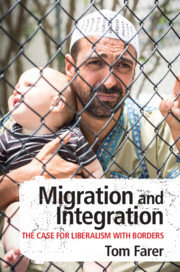Book contents
8 - A Model
Problematic Means for Liberal Ends
from Part III - Hard Choices
Published online by Cambridge University Press: 15 November 2019
Summary
Given the strength of prospective push factors, a plausible plan for shaping and managing migration must include incentives for aspiring migrants to play by the rules rich governments set. The strategy most likely to succeed (success being relative) combines an annual lottery, a point system, and offshore processing and migration-preparation centers. A lottery along with clearly articulated means for accumulating points (e.g., acquiring proficiency in the host country’s language) would give prospective migrants renewable hope that their turn for legitimate entry will come round. Ideally, the EU, in conjunction with the UNHCR, would establish offshore havens where asylum claimants would not only be given humanitarian relief but in addition opportunities to accumulate points through language and vocational training. Internally, rich states would require biometric identification for all transactions and would incentivize and test new arrivals’ capacity for economic and social integration and would organize mentoring of migrants by citizens, protect expressions of religious identity, suppress hate speech, and use the schools to inculcate an inclusive national narrative. Policing would be combined with social services. Compulsory national service is key to deep integration and adequate staffing of schools and overseas havens.
- Type
- Chapter
- Information
- Migration and IntegrationThe Case for Liberalism with Borders, pp. 174 - 208Publisher: Cambridge University PressPrint publication year: 2019

